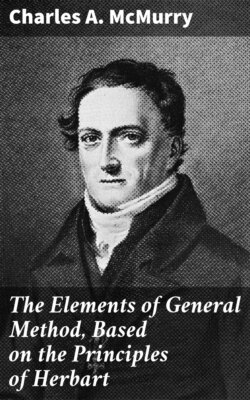The Elements of General Method, Based on the Principles of Herbart

Реклама. ООО «ЛитРес», ИНН: 7719571260.
Оглавление
Charles A. McMurry. The Elements of General Method, Based on the Principles of Herbart
The Elements of General Method, Based on the Principles of Herbart
Table of Contents
PREFACE
CHAPTER I. The Chief Aim of Education. CHAPTER II. Relative Value of Studies. CHAPTER III. Nature of Interest. CHAPTER IV. Concentration. CHAPTER V. Induction. CHAPTER VI. Apperception. CHAPTER VII. The Will. CHAPTER VIII. Herbart and His Disciples Books of Reference. CHAPTER I
THE CHIEF AIM OF EDUCATION
CHAPTER II
RELATIVE VALUE OF STUDIES
CHAPTER III
NATURE OF INTEREST
CHAPTER IV
CONCENTRATION
THE CULTURE EPOCHS
CHAPTER V
INDUCTION
CHAPTER VI
APPERCEPTION
CHAPTER VII
THE WILL
CHAPTER VIII
HERBART AND HIS DISCIPLES
Отрывок из книги
Charles A. McMurry
Published by Good Press, 2019
.....
History, in our present sense, includes what we usually understand by it, as U. S. history, modern and ancient history, also biography, tradition, fiction as expressing human life and the novel or romance, and historical and literary masterpieces of all sorts, as the drama and the epic poem, so far as they delineate man's experience and character. In a still broader sense, history includes language as the expression of men's thoughts and feelings. But this is the formal side of history with which we are not at present concerned. History deals with men's motives and actions as individuals or in society, with their dispositions, habits, and institutions, and with the monuments and literature they have left.
The relations of persons to each other in society give rise to morals. How? The act of a person—as when a fireman rescues a child from a burning building—shows a disposition in the actor. We praise or condemn this disposition as the deed is good or bad. But each moral judgment, rightly given, leaves us stronger. To appreciate and judge fairly the life and acts of a woman like Mary Lyon, or of a man such as Samuel Armstrong, is to awaken something of their spirit and moral temper in ourselves. Whether in the life of David or of Shylock, or of the people whom they represent, the study of men is primarily a study of morals, of conduct. It is in the personal hardships, struggles, and mutual contact of men that motives and moral impulses are observed and weighed. In such men as John Bunyan, William the Silent, and John Quincy Adams, we are much interested to know what qualities of mind and heart they possessed, and especially what human sympathies and antipathies they felt. Livingstone embodied in his African life certain Christian virtues which we love and honor the more because they were so severely and successfully tested. Although the history of men and of society has many uses, its best influence is in illustrating and inculcating moral ideas. It is teaching morals by example. Even living companions often exert less influence upon children than the characters impressed upon their minds from reading. The deliberate plan of teachers and parents might make this influence more salutary and effective.
.....